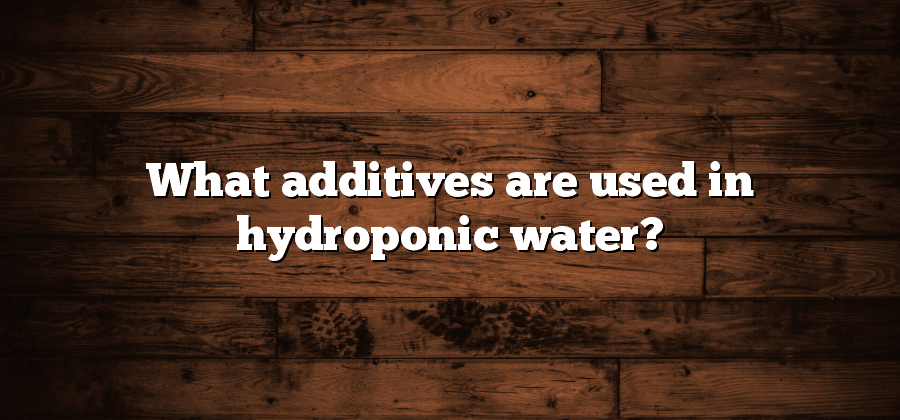Understanding Hydroponic Water Additives
Hydroponics is a soil-less method of growing plants that relies heavily on water as the medium for nutrients and support. In order to ensure the health and productivity of hydroponic plants, various water additives are often used. These additives are specifically designed to address the unique needs of hydroponic systems, promoting optimal plant growth and minimizing the risk of nutrient deficiencies.
One commonly used water additive in hydroponics is pH balancers. Maintaining the proper pH level in the nutrient solution is crucial for nutrient absorption and overall plant health. Hydroponic systems typically require a slightly acidic pH level, ranging from 5.5 to 6.5, depending on the plant species being grown. pH balancers help to adjust the acidity or alkalinity of the water, ensuring that the nutrient solution remains within the desired range. This allows the plants to absorb the necessary nutrients effectively, optimizing their growth and productivity.
pH Balancers for Hydroponic Systems
Maintaining the proper pH balance is crucial for the success of any hydroponic system. In hydroponics, pH refers to the acidity or alkalinity of the nutrient solution in which the plants grow. Different plants have different pH requirements, and it is important to meet those specific requirements in order to achieve optimal growth. pH balancers are an essential tool for hydroponic growers to ensure that the nutrient solution remains within the ideal pH range.
One of the most commonly used pH balancers in hydroponic systems is pH down solution. This solution is usually made of acids such as phosphoric acid or citric acid, which help lower the pH of the nutrient solution when it becomes too alkaline. pH down solution is added in small amounts and gradually to avoid drastic changes that could shock the plants. On the other hand, pH up solution is used to increase the pH of the nutrient solution when it becomes too acidic. pH up solutions are typically made of alkaline substances like potassium hydroxide. It is important to note that pH balancers need to be used carefully and in accordance with the instructions provided by the manufacturers to prevent any negative impacts on the plants’ health and growth.
Nutrient Solutions for Optimal Plant Growth
To achieve optimal plant growth in hydroponic systems, it is crucial to provide the appropriate nutrient solutions. These solutions are specially formulated to fulfill the nutritional needs of plants while they grow without soil. Nutrient solutions typically contain a balanced combination of macronutrients, such as nitrogen, phosphorus, and potassium, as well as essential micronutrients like calcium, magnesium, and iron.
When preparing nutrient solutions, it is important to maintain the correct nutrient ratios to ensure that plants receive the right amount of each element. A nutrient imbalance can lead to nutrient deficiencies or toxicities, causing adverse effects on plant health and overall growth. Additionally, monitoring the pH level of the nutrient solution is crucial as it affects nutrient availability to the plants. Adjusting the pH to the optimal range for hydroponic crops enhances the absorption and utilization of nutrients, resulting in healthier and more robust plant growth.
Importance of Oxygenation in Hydroponics
Oxygenation plays a crucial role in hydroponics, as it directly affects the health and growth of plants. In a hydroponic system, plants are submerged in water, which means they rely on the dissolved oxygen in the water for their respiration process. Adequate oxygen levels are essential for root cell respiration and nutrient uptake in plants. Insufficient oxygen can lead to root rot, nutrient deficiencies, and overall poor plant growth.
To ensure optimal oxygenation in hydroponics, there are a few key factors to consider. Firstly, choosing the right aeration system is essential. Aeration systems, such as air stones or diffusers, help to increase oxygen levels in the water by creating tiny bubbles that mix and circulate the water. Additionally, maintaining proper water temperature is crucial, as colder water can hold more dissolved oxygen. Regular monitoring of oxygen levels in the water is also recommended, as it allows for adjustments to be made if necessary. Overall, adequate oxygenation is essential for the success of any hydroponic system, as it promotes healthy plant growth and maximizes nutrient absorption.
Organic Additives for Sustainable Hydroponics
Organic additives play a crucial role in ensuring sustainable hydroponics. These additives, derived from natural sources, provide numerous benefits to the plants and the overall hydroponic system. One such organic additive is compost tea, which is created using a mixture of compost, water, and sometimes other ingredients like molasses or seaweed extract. This nutrient-rich tea acts as a natural fertilizer, enhancing the growth and health of the plants. Additionally, compost tea contains beneficial microorganisms that aid in improving soil structure and nutrient availability, leading to more efficient nutrient uptake by the plants.
Another organic additive commonly used in sustainable hydroponics is fish emulsion. Made from fish byproducts, this liquid fertilizer is rich in essential nutrients like nitrogen, phosphorus, and potassium. Fish emulsion provides a readily available source of nutrition to plants, promoting healthy growth and high yields. Additionally, fish emulsion also contains amino acids and trace elements that contribute to overall plant health and resilience against pests and diseases. As an organic additive, fish emulsion supports sustainable practices by reducing reliance on synthetic fertilizers and minimizing environmental pollutants.
Organic additives offer a multitude of benefits in sustainable hydroponics, ranging from providing essential nutrients to improving soil structure and promoting plant health. By harnessing the power of natural ingredients, hydroponic growers can create a thriving and eco-friendly system that yields healthy, robust plants. In the following sections, we will explore additional organic additives and their contributions to sustainable hydroponics.






